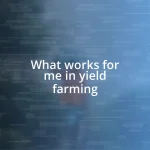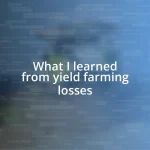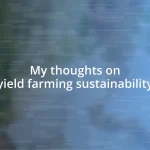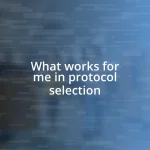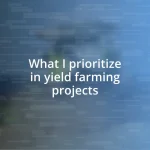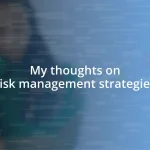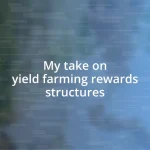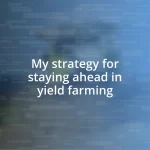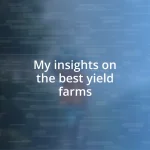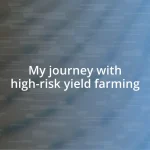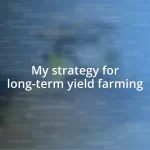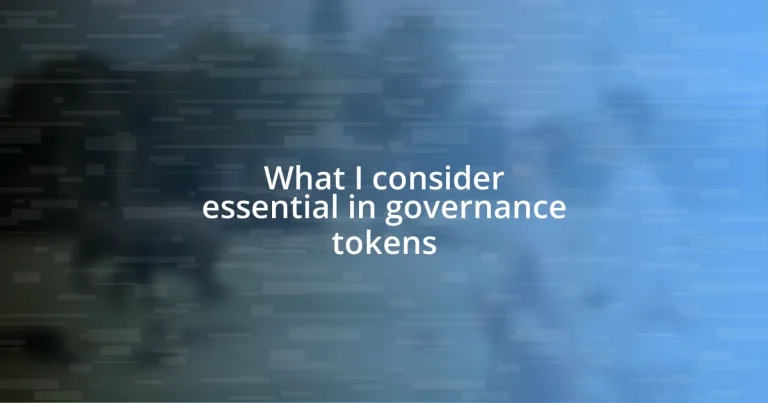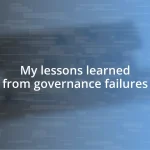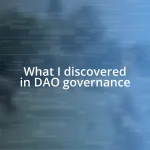Key takeaways:
- Governance tokens empower stakeholders to influence project decisions and foster community engagement beyond mere voting.
- Decentralization enhances innovation, trust, and accountability by distributing power and encouraging diverse participation within a project.
- Effective governance token systems feature transparency in voting mechanisms and adaptability, which are essential for building community confidence and ensuring project relevance.
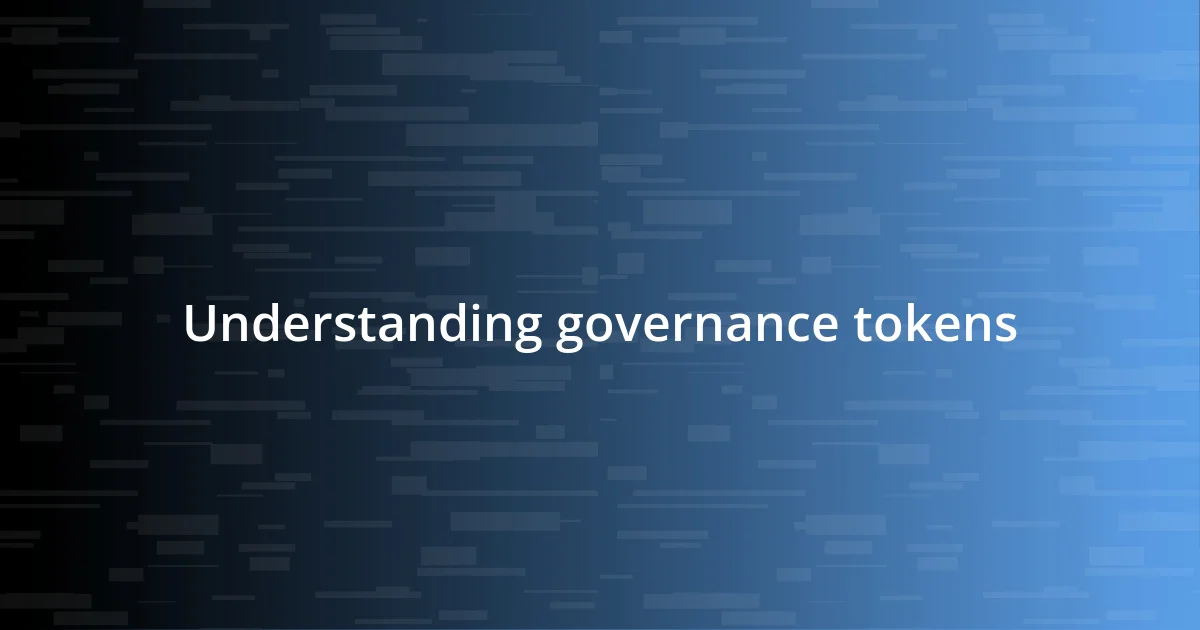
Understanding governance tokens
Governance tokens are an innovative concept that empowers stakeholders within a blockchain ecosystem to influence decisions. I remember the excitement I felt when I first received governance tokens for participating in a project; it felt like being handed the keys to a collaborative community. It’s not just about voting; it’s about actively contributing to the direction of a project, which is a thrilling experience in this decentralized landscape.
The beauty of these tokens lies in their utility, which extends far beyond mere voting rights. For instance, holding governance tokens can also provide access to special features or rewards within the platform. Have you ever felt that rush of being part of something larger, where your input can shape the future? I certainly have, and it showcases how governance tokens can create a deeper connection between users and the projects they believe in.
Moreover, the design of governance tokens often includes mechanisms to ensure fairness and prevent manipulation. I once engaged in a discussion about the importance of equitable voting weights—something that many projects are striving to get right. It’s crucial that governance processes are transparent and accessible; otherwise, the essence of decentralization can easily be compromised. Do you agree that understanding these mechanisms can help us become more informed and responsible participants in these communities?
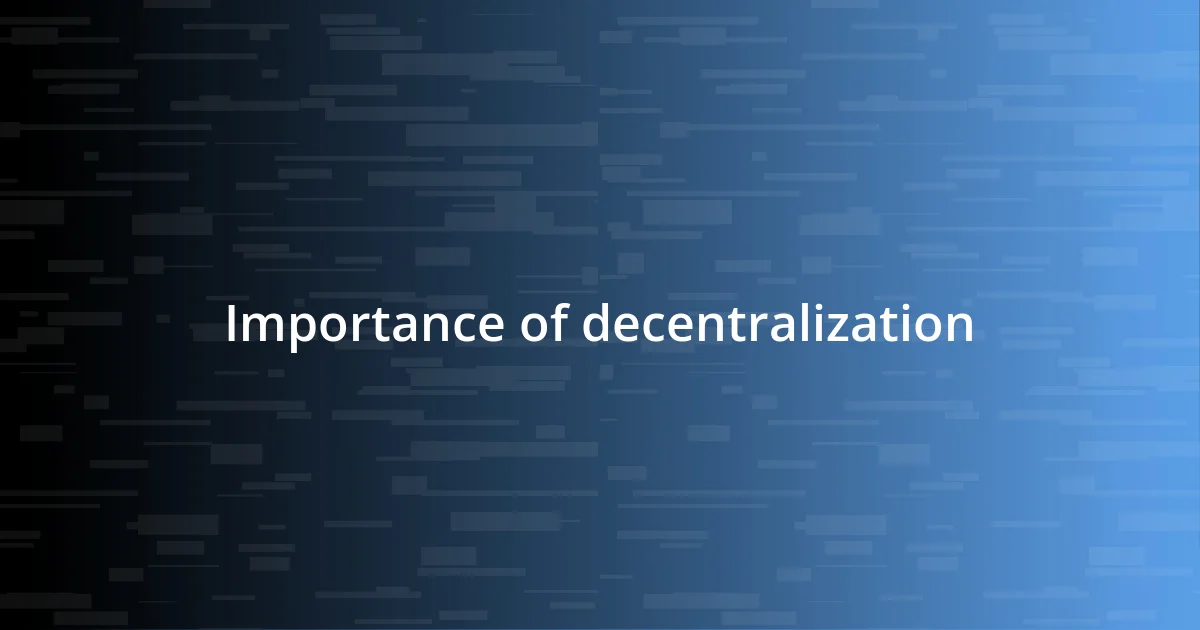
Importance of decentralization
Decentralization is vital because it distributes power among numerous stakeholders instead of consolidating it within a few entities. I vividly recall attending a project meeting where diverse voices shaped the agenda, and it was electrifying to witness that range of perspectives. This distributed approach not only fosters accountability but also mitigates the risk of a single point of failure, which is something I always consider important in governance tokens.
Furthermore, decentralization promotes innovation by allowing a broader range of ideas to flourish. When contributors know their opinions matter, I’ve seen how that motivates them to push creative boundaries and explore unconventional solutions. Have you ever collaborated in a setting where everyone felt empowered? The energy is palpable, and it’s this collaborative spirit that drives projects to success in a decentralized ecosystem.
Lastly, a decentralized structure enhances trust. In my experience, knowing that decisions are made collectively rather than being dictated from the top builds a sense of security among community members. I’ve found that trusting the consensus process makes individuals more likely to invest their time and resources into a project. Isn’t it comforting to know that the governance of a project isn’t just in the hands of a few but is a shared responsibility?
| Aspect | Decentralized Governance |
|---|---|
| Power Distribution | Distributed among many stakeholders |
| Innovation | Encourages diverse ideas and solutions |
| Trust | Built through collective decision-making |
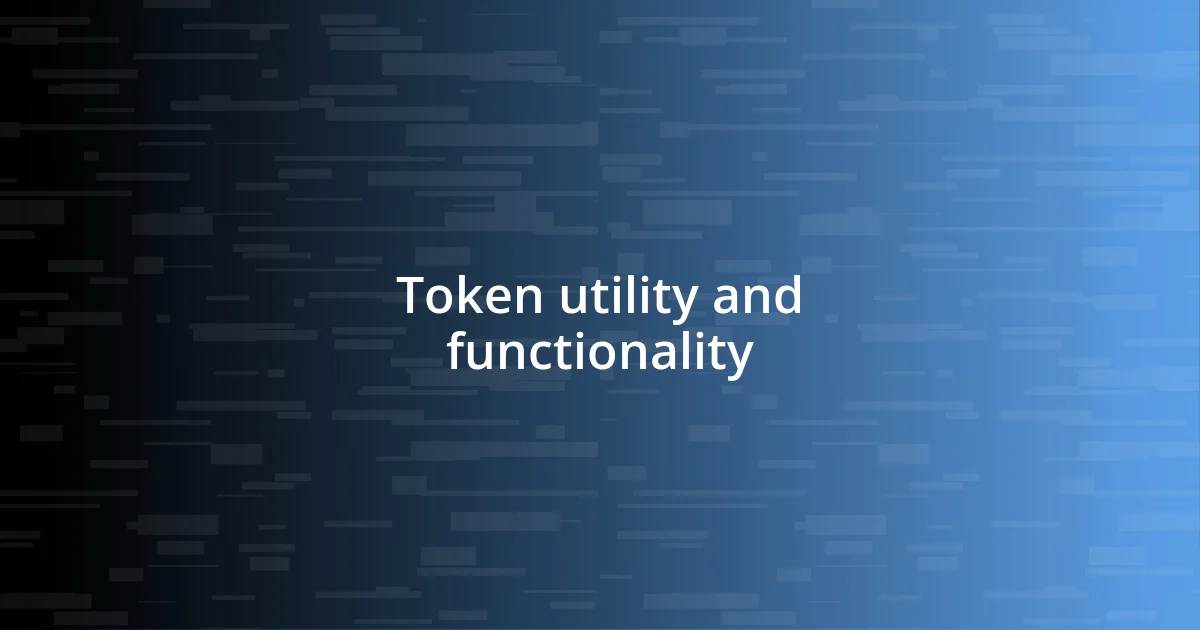
Token utility and functionality
The utility of governance tokens transcends basic voting; it incorporates a variety of functionalities designed to enhance user engagement and foster community loyalty. I remember being astounded when I learned that simply holding governance tokens could qualify me for exclusive project events or opportunities for early access to new features. It’s like having VIP access to concert tickets—there’s a thrilling feeling of exclusivity that draws users closer to the project and encourages them to remain actively involved.
Here are some key functionalities that I consider essential in governance tokens:
- Voting Rights: Tokens give holders the power to influence decisions on platform changes and updates.
- Access to Exclusive Features: Users might unlock advanced tools or services simply by holding tokens.
- Staking Rewards: Participants can earn extra tokens by participating in staking, adding a financial incentive.
- Governance Proposals: Token holders can propose changes that can directly impact the project’s development.
- Community Participation: Engaging in discussions and decisions creates a sense of belonging and investment in future outcomes.
These functionalities enhance not just the personal experience of users, but also foster a vibrant, active community that collectively drives project success. When I think about how these elements work together, it really does feel like crafting a living organism where each token holder contributes their part to the larger ecosystem.
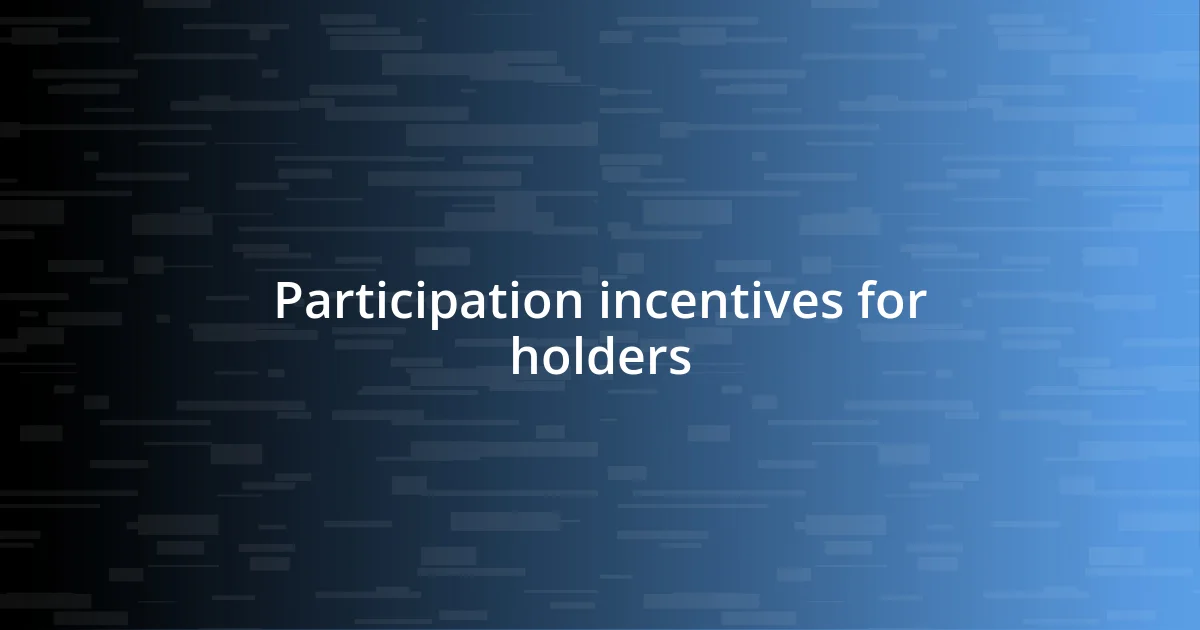
Participation incentives for holders
The design of participation incentives for holders can significantly amplify engagement within a governance ecosystem. For instance, I recall joining a community where participation directly influenced token rewards—not just financially but also in terms of status and recognition. It felt gratifying to see my efforts acknowledged through more than just earnings; it fostered a deep sense of community pride. Isn’t it exciting to think that holding onto a token could also mean being an integral part of shaping its future?
Additionally, I’ve witnessed firsthand how tiered rewards for active participants can elevate the stakes for everyone involved. A few months ago, I learned about a project that offered seasoned holders access to exclusive voting rounds, drastically encouraging even casual users to become more active. Those perks weren’t just enticing; they were motivating. They sparked conversations and strategies among us to unite our voices for the project’s direction—an energizing glimpse into how holders can genuinely influence governance.
Creating an environment where holders are incentivized to be proactive isn’t just a good strategy; it’s essential for sustaining a healthy ecosystem. Think about it: when individuals know that their efforts and insights can yield tangible rewards, they invest more in the project’s success. I remember strategizing with fellow holders during a critical vote, and the excitement was contagious. Each voice counted, and it felt like we were shaping something bigger than ourselves. How often do we get to participate in such dynamic decision-making processes in our daily lives?
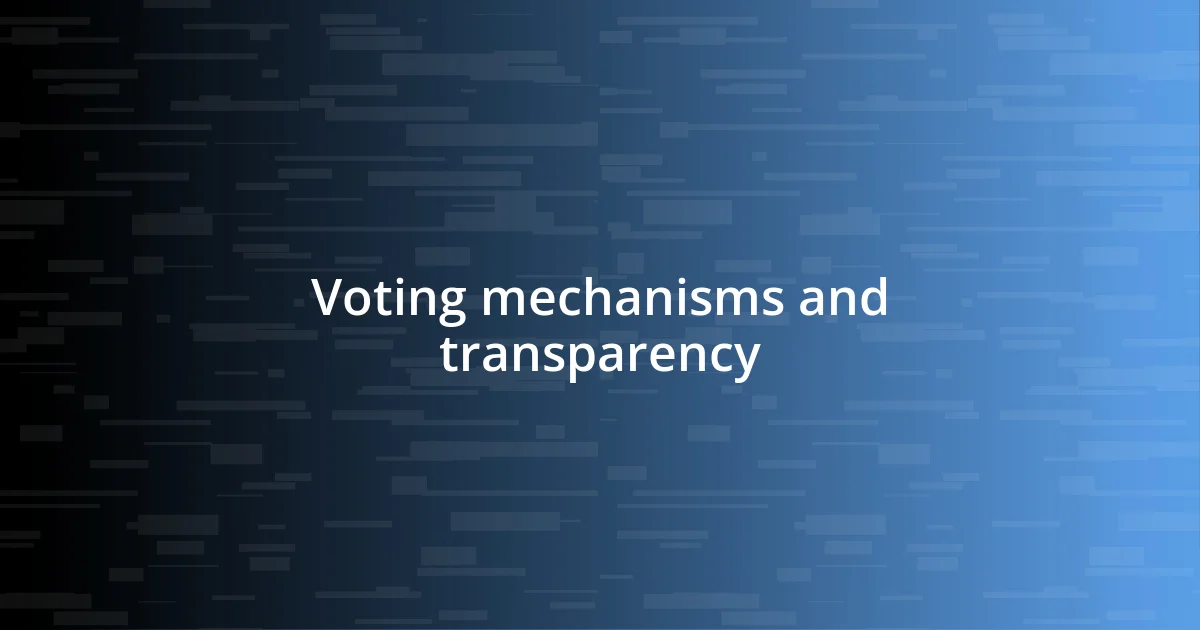
Voting mechanisms and transparency
Voting mechanisms are crucial in governance tokens, serving as the backbone of decentralized decision-making. I vividly recall an experience where I participated in an important vote concerning a new feature rollout. The anticipation was palpable, and I felt a rush knowing my vote could sway the outcome. It’s fascinating how a single click can encapsulate such power and responsibility.
Transparency in these voting systems enhances trust among community members. During one project I was involved with, they shared not only the results but also the voting process in detail—who voted for what and how the decisions were made. Seeing that level of openness made me realize how essential it is for users to feel secure that their voices matter and are accounted for. Don’t you think knowing that our opinions are valued can invigorate our participation?
Moreover, the use of blockchain technology reinforces this transparency. I remember being amazed when I learned how every vote is recorded on an immutable ledger, creating a permanent trail that anyone can review. This not only deters fraud but cultivates confidence among token holders. Doesn’t that make you feel more involved, knowing that your contributions are secure and recognized in the long term?
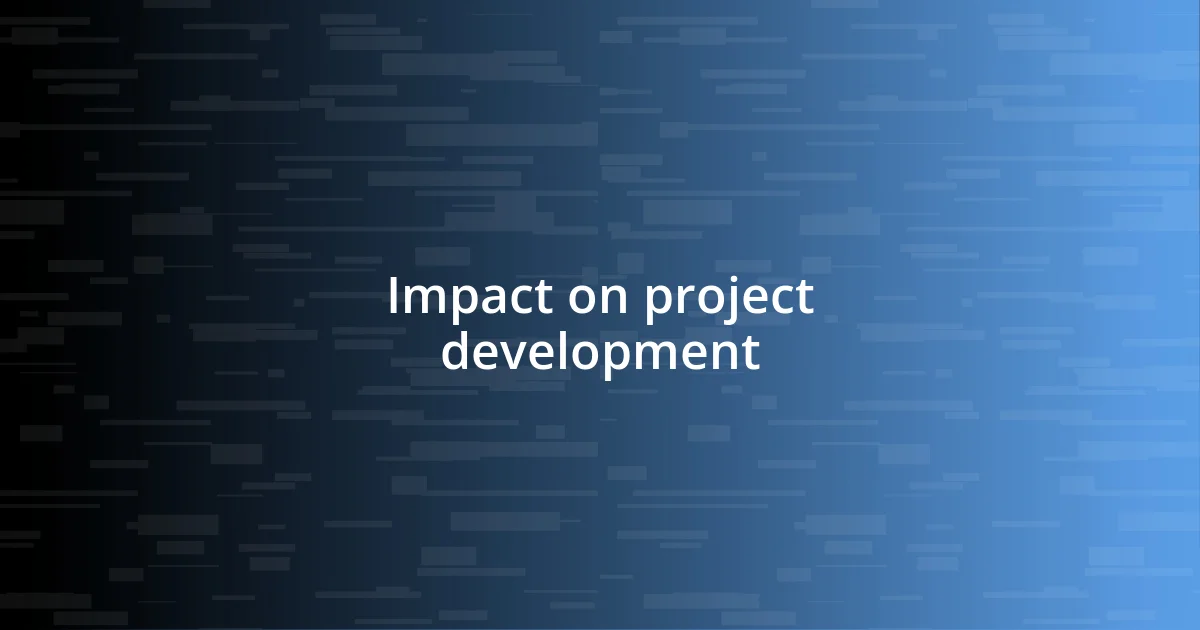
Impact on project development
The development of a project can be directly impacted by governance token dynamics, shaping both strategy and execution. I recently took part in a project where our feedback was integral to refining features. The excitement that came from knowing we could influence design decisions was electrifying. It really gave me a sense of ownership and ownership is key in motivating contributors to enhance project value.
Moreover, active engagement through governance tokens often leads to innovative solutions. I recall a collaborative brainstorming session where token-holders presented ideas based on tokenomics principles. The exchange of perspectives brought fresh insights, proving that diverse opinions could drive significant advancements. Have you ever felt that the collective knowledge of a group could unleash untapped potential? I certainly did that day, and it highlighted the importance of fostering an inclusive environment for development.
On a different note, the incentives associated with governance tokens can streamline resource allocation. In one project, we prioritized funding requests based on community votes, allowing us to direct resources toward areas that matter most to us. It felt empowering to see the community’s needs reflected in action, creating a shared vision for success. How often do we get to decide the trajectory of a project simply because we’re invested in it? Those moments of influence are invaluable and genuinely transformative for any project’s development journey.
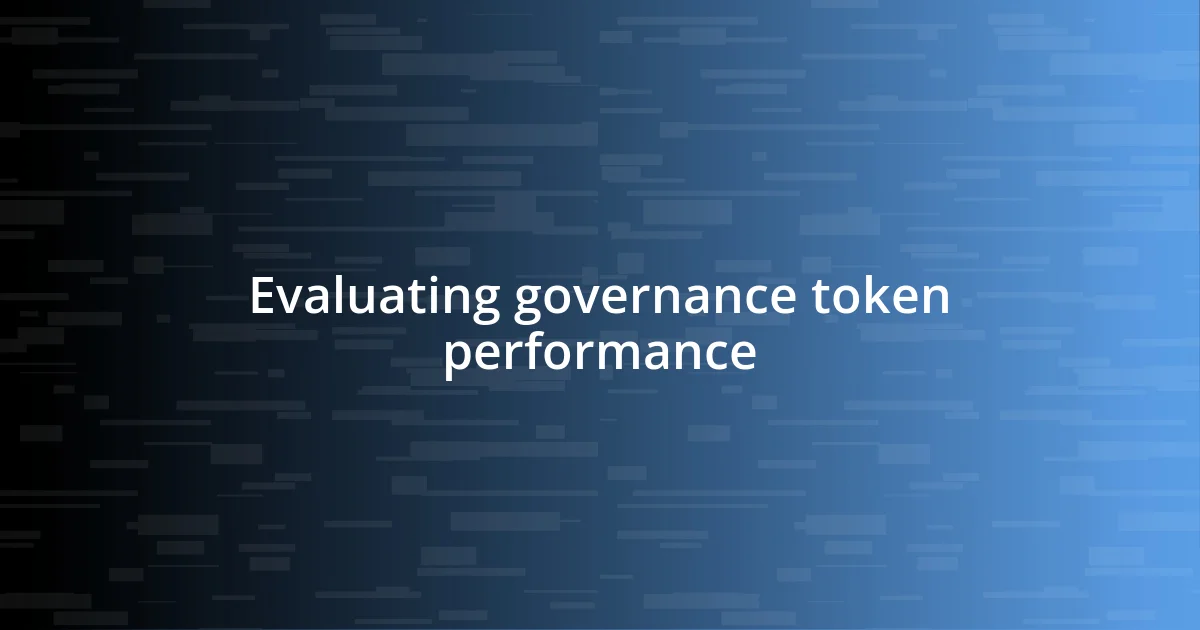
Evaluating governance token performance
Evaluating the performance of governance tokens often hinges on several key factors, including community engagement and the effectiveness of decision-making processes. In my experience, I’ve noticed that tokens with high participation rates tend to foster a more vibrant and responsive community. It’s like being part of a conversation where every voice counts; doesn’t it feel more fulfilling when your opinion isn’t just heard but actively shapes outcomes?
Another aspect worth considering is the impact of token utility on performance. For example, I became deeply invested in a platform that allowed governance tokens to unlock various benefits, such as exclusive access to new features or reduced fees. This added layer of incentive transformed how I viewed my token holdings. Have you ever felt that spark of motivation when you know your contributions result in tangible rewards? That sense of purpose is what can elevate a governance token’s value significantly.
Lastly, assessing the adaptability of governance tokens is crucial. I reflect on a scenario where a governance model had to pivot due to community feedback, resulting in a more flexible framework for decision-making. Witnessing that level of responsiveness inspired confidence in the project, leaving me wondering: how much more resilient could governance tokens become if they continually evolve based on user input? That adaptability can be a game changer in ensuring long-term success and relevance.
